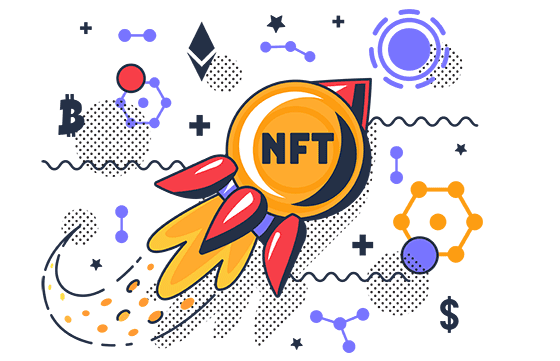The marketing ecosystem is rapidly evolving due to the introduction of state-of-the-art technologies that foster meaningful consumer engagement. Digital marketing helps brands attract and retain consumers and better serve them at any point of interaction. Yet, it isn’t without its shortfalls.
Blockchain enables data to be stored globally on thousands of servers. It provides full incorruptible transparency regarding information entered into the network. It will serve as an incredible backbone for marketing applications that were unthinkable a few years ago. But before we dive deeply into its effect on digital marketing, let’s discuss some of the marketing pain points that affect both marketers and consumers currently:
Ad fraud: Advertisers lose a large portion of their ad budget to frauds such as fake prints, fake clicks, ad stacking, domain spoofing, pixel stuffing, and more. This is a significant problem for data-driven marketers, resulting in higher advertisement investment but low ROI.
Standardized contracts: Digital marketing contracts are often standardized, resulting in countless wasted hours in back and forth communications between the parties involved due to project scope adjustments and ambiguous terms & conditions.
Bad monetization: Research shows that users would prefer to monetize their own personal identifiable information (PII) instead of losing ownership of the same to third-party publishers who monetize it without the user’s discretion.
Restricted control over shared data: In most situations, end-consumers do not control their data when offering it to an online network. The data will remain on the server of the application, and users will not be able to monitor their usage or will not always be able to withdraw consent to the sharing of data. Data breaches and cyber-attack exacerbate the problem.
Lack of transparency: Marketers cannot always check the ROI of their ad spending from a single authentic source, resulting in weak ad optimization and overall unsuccessful campaigns.
Ad overestimation: Ad overestimation is invasive, results in ad fatigue, and ultimately results in negative brand perception. Digital marketing is also at risk of over-expenditure, leading to under-performance of campaigns amid consumer interest.
Say hello to digital marketing powered by Blockchain technology
Blockchain addresses most of the marketing pain points mentioned above. It will build a digital marketing ecosystem focused on the foundations of decentralization, transparency, and immutability. It allows transactions between two parties without the need for third-party verification. Blockchain can revolutionize digital marketing by giving consumers more power over their data and fostering greater brand trust.
Intermediaries elimination: With Blockchain, advertisers may bypass ad networks and ad exchanges and directly advertise on ad space online platforms without the need for a middleman like Google to connect with website owners and create trustworthiness.
Reduced ad spending: By eliminating the middleman, marketers can minimize ad spending and allocate resources for other activities.
More transparency: Brands can validate ad metrics on their own without needing to hire third-party services. The outcome? Higher ROI on online spending and diminished ad fraud. Blockchain helps marketers target the right audience and authenticate clicks by verifying whether a real person and not a robot saw their ad.
Smart Contracts: Unlike traditional contracts, marketers may use Blockchain to create smart contracts that guarantee transaction settlement only after specific requirements have been met, allowing more versatile, dynamic, and transparent pricing models. These are particularly useful for influencer marketing, where both parties can maintain 100% integrity and compliance with the contract terms.
Increased data control: Blockchain empowers users by placing them in charge of their data instead of advertisement platforms and data collection firms. It also provides an environment in which customers can be paid for the value of their data.
More clarity for customers: Nowadays, consumers are more conscious of and demand value for their money. Blockchain enables product and service traceability. Brands can establish undisputable trust since consumers can check whether a beauty brand is cruelty-free, if a food item is organic, or any other claims made by manufacturers and service providers.
Accurate consumer information: In addition to a cohesive view of customers across platforms, marketers can gain accurate real-time customer preference information by monitoring the ads they choose to engage with.
Current Blockchain bottlenecks for digital marketing
Blockchain is not yet a commonly used technology and will face competition from tech giants such as Google and Facebook.
For marketers to rely solely on the Blockchain, a greater number of users will have to come on board.
Another significant challenge is the lack of scalability of blockchain transactions, particularly for public blockchains. For example, the Ethereum blockchain network can handle a limit of 20 transactions per second compared to Mastercard, which can process over 2000 transactions per second.
Blockchain suffers from an image issue due to its immediate connection with cryptocurrencies, which is actually not legally foolproof in several ecosystems and carries no “official” value authority.
Regardless of the current challenges, Blockchain technology is here to stay and will ultimately revolutionize marketing and all activities related to it. Underestimating Blockchain is foolish. It will evolve just like the internet did. Twenty years ago, the concept of social media marketing didn’t exist, and today it is an indispensable tool for digital marketers. The sky’s the limit for Blockchain, and digital marketers should start educating themselves about it so they don’t get caught off guard once it truly takes off.
Get in touch with me on LinkedIn and follow me on Medium.















